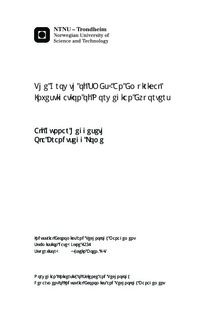| dc.contributor.advisor | Moen, Oystein | nb_NO |
| dc.contributor.author | Heggeseth, Alf Gunnar | nb_NO |
| dc.contributor.author | Lome, Ola Brandtsegg | nb_NO |
| dc.date.accessioned | 2014-12-19T14:28:26Z | |
| dc.date.available | 2014-12-19T14:28:26Z | |
| dc.date.created | 2013-06-09 | nb_NO |
| dc.date.issued | 2012 | nb_NO |
| dc.identifier | 626512 | nb_NO |
| dc.identifier | ntnudaim:7172 | nb_NO |
| dc.identifier.uri | http://hdl.handle.net/11250/266214 | |
| dc.description.abstract | This thesis consists of two articles. Article one investigates the interdependent relationships between motivation for growth, the firm’s international orientation, its past growth and subsequent performance. Although these construct to a limited degree have been treated in previous literature, hardly any studies have examined their comparative and complementary effects on growth in revenue, employment and export sales. Our findings reveal a close and interdependent relationship between the motivation for growth and the international orientation of the firm: Firms with a strong motivation for growth tend to have a high international orientation and display superior growth both domestically and abroad. The positive connection between international orientation and performance indicate that even though international involvement may be resource demanding and put additional strain on the domestic activities, a high international orientation is positive for overall firm growth. Additionally, our results also reveal that some firms were able to systematically outperform the rest throughout the whole eleven year period. Article two takes a slightly different perspective on firm growth and investigates the importance of R&D activities during a financial crisis. Though several studies have found a positive connection between R&D and subsequent performance in periods of normal growth, existing literature provide limited guidance to managers about the particular role of R&D during a recession. As the external environment of the firm greatly differs during a recession, so may also the importance of R&D activities. Our findings reveal that firms who devoted considerable resources to R&D activities performed significantly better than the rest through the late 2000’s financial crisis. The connection between R&D and performance actually turned out to be comparatively stronger during the financial crisis than in the growth period from 2004-2008. Thus, the importance of R&D activities seems to be accentuated during a financial crisis. For business managers, this implies that R&D activities can serve both to boost growth in normal times and as a way to bolster the firm for the inevitable next recession. | nb_NO |
| dc.language | eng | nb_NO |
| dc.publisher | Institutt for industriell økonomi og teknologiledelse | nb_NO |
| dc.title | The Growth of SMEs: An Empirical Investigation of Norwegian Exporters | nb_NO |
| dc.type | Master thesis | nb_NO |
| dc.source.pagenumber | 65 | nb_NO |
| dc.contributor.department | Norges teknisk-naturvitenskapelige universitet, Fakultet for samfunnsvitenskap og teknologiledelse, Institutt for industriell økonomi og teknologiledelse | nb_NO |

